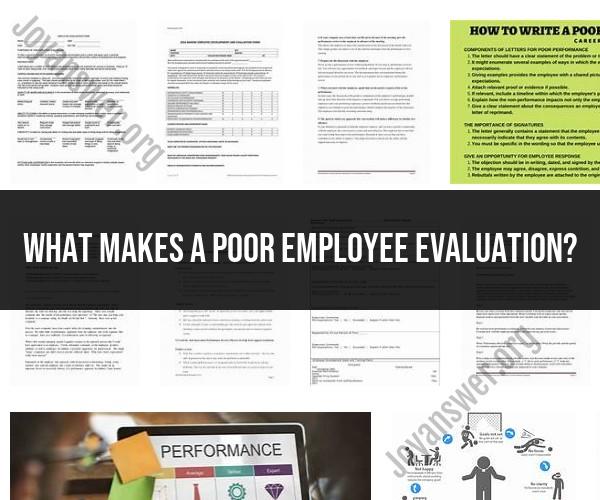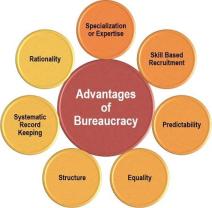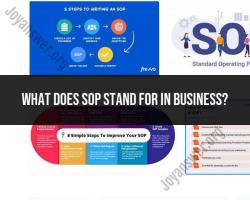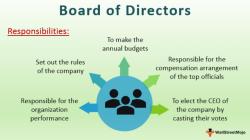What makes a poor employee evaluation?
A poor employee evaluation can result from various factors, both on the part of the employee and the employer. Here are some common causes of poor employee evaluations and strategies for improvement:
Causes of Poor Employee Evaluation:
Lack of Clear Expectations: When employees are not provided with clear job descriptions, performance expectations, or goals, it can lead to confusion and uncertainty about what is expected of them.
Inadequate Training: If employees do not receive proper training or have access to necessary resources, they may struggle to perform their tasks effectively.
Communication Issues: Poor communication between employees and managers can result in misunderstandings, missed deadlines, and errors.
Unrealistic Goals: Setting unrealistic or unattainable performance goals can set employees up for failure and result in poor evaluations.
Inadequate Feedback: If employees do not receive regular and constructive feedback on their performance, they may not be aware of areas needing improvement.
Lack of Motivation: Employees who are demotivated or disengaged may not put forth their best effort, leading to poor performance.
Personal Problems: Employees facing personal challenges or stressors may find it difficult to focus on their job responsibilities, impacting their performance.
Health Issues: Physical or mental health problems can affect an employee's ability to perform at their best.
Improvement Strategies:
Clear Expectations: Ensure that employees have a clear understanding of their roles, responsibilities, and performance expectations. Provide written job descriptions and performance goals.
Training and Development: Invest in training and development programs to enhance employees' skills and knowledge. Offer opportunities for ongoing learning.
Effective Communication: Foster open and transparent communication channels within the organization. Encourage employees to ask questions and seek clarification when needed.
Realistic Goal Setting: Set achievable and measurable performance goals. Collaborate with employees to establish objectives that are challenging yet attainable.
Regular Feedback: Conduct regular performance reviews and provide constructive feedback. Recognize and acknowledge employees' achievements and improvements.
Employee Engagement: Promote employee engagement through initiatives such as team-building activities, recognition programs, and opportunities for career advancement.
Employee Assistance Programs: Offer support for employees facing personal or health-related challenges through Employee Assistance Programs (EAPs) or flexible work arrangements.
Work-Life Balance: Encourage work-life balance to help employees manage personal and professional responsibilities effectively.
Performance Improvement Plans: If an employee consistently underperforms, consider implementing a performance improvement plan (PIP) that outlines specific goals and timelines for improvement.
Manager Training: Provide training to managers on effective performance management, communication, and coaching techniques.
It's important to note that poor performance should be addressed promptly and constructively, with a focus on helping employees improve rather than punitive measures. Employees should also be given the opportunity to provide input and share their perspectives during performance evaluations to ensure fairness and accuracy.
Deconstructing a Poor Employee Evaluation: Common Pitfalls and Red Flags
A poor employee evaluation can be a demoralizing experience for both the employee and the manager. It can also lead to negative consequences such as performance improvement plans (PIPs), demotions, or even termination.
Here are some common pitfalls and red flags to look for in a poor employee evaluation:
- Vague or unsubstantiated feedback: The evaluation should provide specific examples of the employee's performance deficiencies. If the feedback is vague or unsubstantiated, it will be difficult for the employee to understand what they need to improve.
- Personal attacks: The evaluation should focus on the employee's work performance, not on their personal characteristics. If the evaluation contains personal attacks, it is likely to be seen as unfair and biased.
- Unrealistic expectations: The evaluation should set realistic and achievable goals for the employee. If the expectations are unrealistic, the employee is likely to set up for failure.
- Lack of constructive feedback: The evaluation should provide constructive feedback that the employee can use to improve their performance. If the evaluation is simply a list of criticisms without any suggestions for improvement, it will not be helpful to the employee.
Analyzing Negative Feedback: What Constitutes a Subpar Employee Evaluation
If you are concerned that you may have received a subpar employee evaluation, there are a few things you can do to analyze the feedback:
- Identify the key areas of criticism. What are the specific areas where your manager says you need to improve?
- Evaluate the feedback. Is the feedback specific and substantiated? Is it fair and unbiased? Are the expectations realistic? Is the feedback constructive?
- Talk to your manager. If you have any questions or concerns about the feedback, talk to your manager. They may be able to provide you with more context or clarification.
Improving Performance Reviews: Strategies to Avoid a Poor Employee Evaluation
There are a number of things you can do to improve your chances of receiving a positive employee evaluation:
- Set clear goals and expectations with your manager. Make sure you understand what your manager expects of you in your role.
- Be proactive and take initiative. Don't wait for your manager to tell you what to do. Look for ways to improve your performance and contribute to the team.
- Be open to feedback and be willing to learn from your mistakes. If your manager gives you feedback, be receptive and be willing to make changes.
- Communicate regularly with your manager. Keep your manager updated on your progress and let them know if you are having any difficulties.
If you have received a poor employee evaluation, don't be discouraged. There are steps you can take to improve your performance and avoid receiving another poor evaluation in the future.












